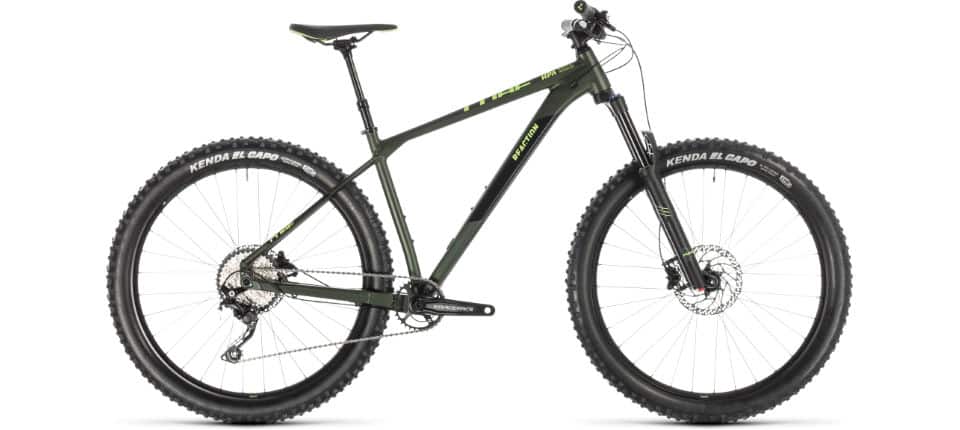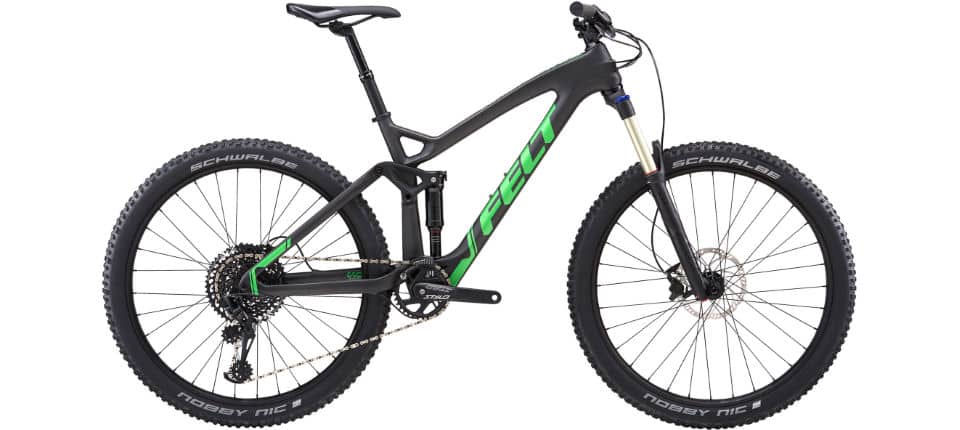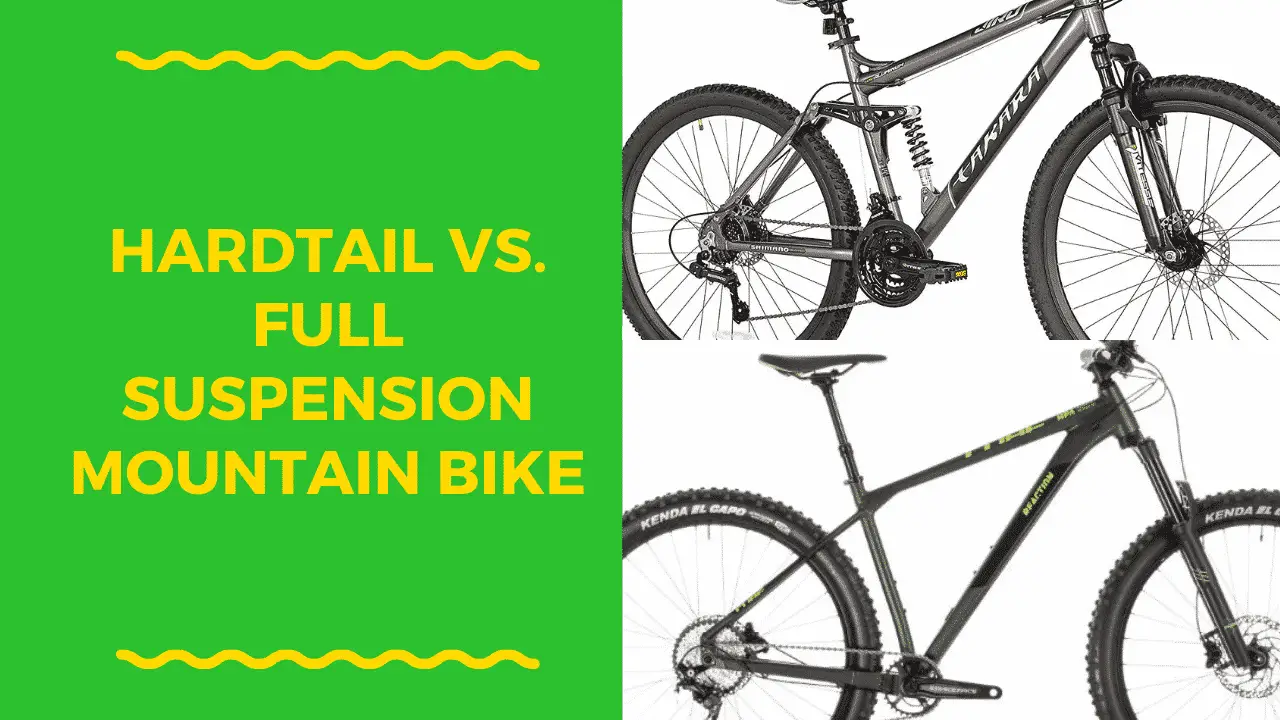If you’re a bike enthusiast, you know that choosing the best mountain bike was not a hard call back then. In any case, it was a case the bike with the fattest tires and that with a rim braking system.
But that changed with the introduction of the front (Hardtail) and Rear (full) suspension. The suspension was a big welcome to the cycling fraternity and made life more fun.
However, it made the process of purchasing the dream mountain bike more confusing.
However, choosing between these two models of bikes is not a hard call. At the most basic level, the two models differ by the location and number of shock absorbers.
A hardtail, for instance, has a suspension fork only at the front, while the full suspension bikes have both rear and front suspension shock absorbers.
But beyond shock absorption, the hardtail and full-suspension bikes greatly differ in various attributes such as geometry, performance, and purpose.
Contents
What is a Hardtail Bike?

A commonly held belief is that hardtails bikes are dead, but in reality, that is further away from the truth.
Like the full suspension, the hardtail MTB still have their rightful place in the modern-day mountain biking.
A hardtail is a type of bike featuring a rigid frame, and features a front suspension, but lacks a rear suspension
What is Full-Suspension Bike?

Contrary to the hardtail bikes, full-suspension bikes feature shock absorbers on both the front and at the rear.
Also known as dual-suspension bikes, the full-suspension bikes absorb much more impact and are therefore more appropriate for the technical trail.
Similarities between Hardtail and Full Suspension Bicycles
Both of these models are mountain bikes.
As such, they’re both adept at handling the rugged mountain terrain with ease.
Differences between Hardtail and Full Suspension Bikes
Feature | Hardtail | Full Suspension Bike |
Weight | Light | Heavy |
Comfort | Less-forgiving | Incredible |
Maintenance | Little maintenance | Maintenance-intensive |
Performance | Ideal for climbing | Ideal for downhill |
Price | Budget-friendly | Expensive |
Weight
The presence of additional moving parts on the full suspension bikes translates to more weight.
Generally, a full-suspension bike will weigh at least a 2 pounds more than a similarly spec'd hardtail.
This is to means a hardtail is easier to maneuver, and can easily handle the steep climbs. The very rigidity of the hardtail MTB feels natural when riding the bikes.
However, if you have a budget, you can as well as purchase a full-suspension bike that is as lightweight as a hardtail.
Still, the weight penalty on the full-suspension bike is quite negligible. And unless you're an elite racer, the 2 pounds make little difference if any, especially when you factor the fun and comfort of the rear suspension.
Regarding weight, the hardtail is the clear winner.
Nonetheless, the best bike will ultimately depend on your riding. If you’re like me, for instance, and prefers an all-around bike, the heavier full suspension bike should be ideal. However, if you love tackling the steep climbs, the hardtail will provide a relatively easier time.
Performance
Downhill
When navigating the deep descents, the full suspension bikes are hard to beat but don't count the hardtail out, yet.
In a hardtail, the rear suspension is offered by your legs. The net result is that you’ll get tired faster
The rear suspension alongside the weight of the full-suspension bike will allow you to handle the descent with greater efficiency.
However, a technical downhill on a hardtail will make you more resistant, make you choose a better line for the descent, and with time, it'll make you a better overall rider.
Climbing
During climbing, the hardtail bikes are known for their efficiency at transferring the pedaling power to the rear wheel.
Consequently, this allows the bike to deliver greater acceleration and allows you to sustain higher speeds over long distances.
Comfort
Full suspension bikes are more comfortable than the hardtails.
The dual suspension combination helps to dampen the rough terrain. This means that your body won’t have to take the brunt of the trail.
With a full suspension bike, you’ll get more confident handling the rough and technical terrain.
The hardtails, on the other hand, feature a single suspension system on the front section of the bike.
Ideally, these bikes are meant for those who are looking to tackle the fairly smooth terrain.
In the absence of a safety net of rear shock to help you, the hardtails are less-forging on the rough terrains.
Maintenance
Naturally, fewer moving parts on the hardtail mean that there’s a lesser chance for repairs.
Again, hardtails, unlike full suspension bikes, are mechanically simple. With a hardtail, you'll not have to worry about rear shocks, extra mounts, or any pivots.
If you love simplicity and want to keep the maintenance costs as low as possible, the hardtail bike is hard to beat.
Aesthetics
The dream bike for any cyclist is dependability, sturdiness, and comfort.
But let's be honest; you also care about aesthetics.
I love the simplicity of the hardtail, while others prefer the sophisticated and aggressive looks of the full suspension MTB.
Here, there’s no outright winner since aesthetics are quite subjective and it all boils down to personal preferences.
Price
Full suspension bikes are not without issues, and one of them is the price.
FS bikes are expensive and require a lot of maintenance.
Hardtail mountain bikes, on the other hand, are a budget-option and do not require much maintenance.
Between the two, which one do you think would suit your cycling needs?

